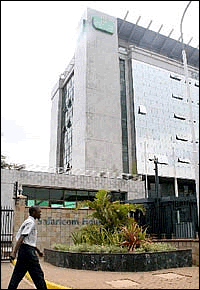Safaricom IPO: A Watershed IPO

 |
| Safaricom House |
If profits would ever lie about a company’s value, I would tell politicians to yell more. But with a buzz on all fundamentals, I would ask politicians to shut up.
I have an issue with politicians who have in the past few weeks questioned why Kenyans should invest in the Safaricom Initial Public Offer (IPO). Many argue that the mystery surrounding the Guernsey registered Mobitelea Ltd. needs to be resolved. Further, it is alleged that the company, which owns 5 percent of Safaricom should either be scrapped off the Safaricom ownership or forced to pay up for what is believed to have been given to them free of charge.
Whereas a section of people has been sending messages on mobile phones and emails inciting the public to boycott the offer ‘in large numbers,’ financial institutions have on the other hand encouraged Kenyans to subscribe for the IPO in large numbers. I support the latter- not because that is where I earn my daily bread, but because, as an investor, I am entitled to make financial decisions on a cost benefit analysis but not the degree of patriotism. The decision however has to be pegged with all governance issues duly considered.
If Kenyans decided to boycott the offer because a politician has said so, who gains most? Is it the politician, the ‘Kenyan investor’ or the ‘Patriotic Kenyan’? There are concerns over the validity of all these claims. And in as much as there is a likelihood of foul play by the government, boycotting the IPO does not solve any problem: it only worsens it. It is prudent that one heavily subscribes, falls in the category of top shareholders, then question the validity of other shareholders on the same board. In such a case, you can claim governance issues in a company you already fall in as a shareholder.
Considering the size of the offer, I encourage investors to buy the shares for a number of reasons. First, the inflation rate at the moment is quite high. This is owing to the state of the economy a few months ago where most people recorded losses in their businesses and majority of individuals lost their jobs. The market may not be in a position to absorb the Kshs. 50 billion offer. Second, the company by nature is profitable. Its after tax profits as at September 2007 were at over Kshs. 17 billion. This is indisputably high and attractive for foreign investors who look for value and bargains.
There is likelihood that foreign corporate investors will be looking for bargains in the secondary market once the company starts trading. This could create demand driven price appreciation that will make good gains for the speculative investor.
Unlike before where investors find the Nairobi Stock Exchange (NSE) too lowly capitalized, the safaricom IPO serves as an opening for investors who see a shift in the Kenyan market from a frontier to an emerging market. We are likely going to witness a run on all counters brought about by the international awareness of the local bourse. This could generate an interest in all counters whose growth is steered by growth in the national economy. Such companies, mainly industrial and financial institutions are likely to earn some good returns.
Forget the political rhetoric, and buy into the IPO. If you are credit worthy for a bank loan, go for it and invest. The most you can pay to any bank is 2 percent per month. The same will earn you at least 50 percent in the two month period before listing. Trust me, some of the politicians making noise already have their checks ready, or at least, a good fortune to subscribe on the last few days before closure.
